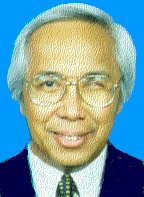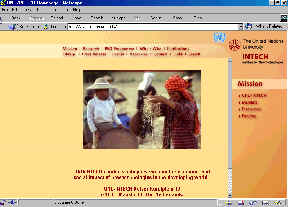
|
|
||||||||||
|
Issue 5: November – December 2000 |
||||||||||
UNU to host workshop on social sciences and innovation 2. Conference delegates discuss ethics of gene research 3. Lessons from the 1997-98 El Niño: once burned, twice shy? 4. New Directors appointed to WIDER and IAS 5. New INTECH web site faster, easier to use 6. WIDER Angle focuses on challenges of IT 7. Application deadline for UNU courses is Jan. 31 8. Calendar of events and meetings UNU to Host OECD Workshop on
|
 |
|
Professor Nathan Rosenberg |
Professor Nathan Rosenberg of Stanford University will deliver the keynote address – "Challenges to the Social Sciences in the New Millennium" – beginning at 4pm on November 29 in the U Thant International Conference Hall (third floor, UNU Centre). The session is open to the public and admission is free, although advance registration is required.
Workshop participants, including invited international experts and delegates from OECD member countries, will then discuss the roles of social sciences in the context of rapidly progressing innovation in the new millennium. The first plenary session, chaired by IIR Director Seiichiro Yonekura, will focus on "Promoting Innovation." The second, chaired by UNU Rector Hans van Ginkel, will consider "Innovation, Science and Society." Three working groups will meet to examine issues of technological innovation, social innovation, and the societal impacts of innovation.
Click here to see the complete programme. For further information, contact UNU Public Affairs.
Conference Delegates
Discuss
Ethics of Gene Research
Gene research, affluence and poverty, national reconciliation and religion and culture were among the focus issues discussed at the International Conference on Global Ethos held at UNU Centre, Tokyo, October 24-26.
The conference was organized by UNU Centre and UNU Institute of Advanced Studies (UNU/IAS) as part of the UNU contribution to the United Nations Year of Dialogue among Civilizations: 2001. It is also a major source of input into the ongoing IAS project exploring the relationship between global ethos and sustainable development.
The conference brought together academics, practitioners and thinkers from all over the world to contribute to a global dialogue focusing on current issues and dilemmas that challenge traditional values and ethics frameworks in four thematic areas:
-
Global Capitalism and Sustainable Development
-
Science, Knowledge, and Ethics
-
International Society, Justice and Equity
-
Religion, Gender, and Culture.
Background papers can be viewed at the conference website.
Lessons From the 1997-98 El Niño:
Once Burned, Twice Shy?
Thousands of human casualties and tens of billions of dollars in economic damage will continue to befall the world's developing countries every two to seven years until an investment is made to improve forecasting and preparedness against El Niño, a new international study warns.
The study, a joint project of UN University, UN Environment Programme (UNEP), World Meteorological Organization (WMO), the International Strategy for Disaster Reduction and the US-based National Center for Atmospheric Research (NCAR), says more reliable El Niño forecasts and the capability of governments to react quickly to them are critical. In the absence of such capabilities, vulnerable people, infrastructure and economies in many parts of the world will continue to suffer periodically from El Niño's wrath - floods, fires, drought, cyclones, and outbreaks of infectious disease.
 |
|
Flood cleanup in Bangladesh during the 1997-98 El Niño |
The creation of regional organizations to prepare collective responses to El Niño is one of the key recommendations from the 19-month study developed by teams of researchers working in 16 countries in Latin America, Asia, and Africa. The research was made possible with the support of the United Nations Foundation through the UN Fund for International Partnerships.
The study says few forecasters came close to forecasting El Niño's onset in mid-1997 and none were able to grasp the magnitude of the "El Niño of the Century" until it was well under way. National and regional forecasters typically provided predictions of El Niño impacts that in many cases were too general to be used with confidence by national and local decision makers. In some places, authorities were forced to make vital and costly decisions with uncertain - and in some cases misleading - information about El Niño's expected punch.
"El Niño is not a freak occurrence - it recurs every two to seven years on average and is becoming an increasingly predictable part of the global climate system. We need to accelerate our understanding of it and be better braced to deal with its devastating consequences," said Hans van Ginkel, UN Under Secretary-General and Rector of UN University.
Said Klaus Töpfer, Executive Director of the United Nations Environment Program: "Too little is happening in developing countries to prepare for the next El Niño, despite having endured devastating damage and deaths in 1997-98. Developed countries have a moral obligation to help affected nations prepare for and minimize El Niño's setbacks in their battle against poverty and disease."
While there may have been reasons to excuse the lack of appropriate responses by governments, industries or individuals to the 1997-98 El Niño, the story should not repeat itself when it comes to the next El Niño events, said Dr. Michael Glantz, Senior Scientist at NCAR and the report’s principal investigator.
New Directors Appointed
to WIDER and IAS
UNU Rector Hans van Ginkel has announced the appointment of new directors for the UNU World Institute for Development Economics Research (UNU/WIDER) in Helsinki and the UNU Institute of Advanced Studies (UNU/IAS) in Tokyo.
 |
|
Professor Tony Shorrocks |
|
Photo by Kimmo Brandt |
Professor Tony Shorrocks will take over as Director of UNU/WIDER on January 1, 2001. Professor Shorrocks is currently a Visiting Professor at New Economic School in Moscow and Research Professor at the University of Essex.
Professor Shorrocks is a leading scholar in the field of income
distribution. His research has focused in particular on the methods of
measuring and analyzing inequality, poverty, income mobility and living
standards. Numerous papers on these topics have appeared in international
economic journals including Econometrica, Review of Economic Studies,
Economic Journal and Economica.
More recently he has been working on the social problems facing Russia in the post reform era. In 1996 he was elected a Fellow of the Econometric Society.
 |
| Professor Zakri Hamid |
Professor Zakri Hamid, currently Deputy Vice Chancellor at the
National University of Malaysia, will become Director
of UNU/IAS at the beginning of next year.
Prof. Zakri received his Ph.D. in Genetics and Plant Breeding from
Michigan
State University in 1976. Since then he has worked at the National
University of Malaysia, where he was made a full professor in 1986. He has
published extensively on the issues of genetics, plant breeding,
biotechnology and biodiversity.
Increasingly in recent years he was worked as an academic administrator at
the National University of Malaysia. He has served as the head of
department
of genetics, dean of faculty of life sciences and, since 1992, as deputy
vice chancellor.
Prof Zakri also has extensive policy experience at the national and
international levels. Since 1999, he has been the interim
Chair
of the Millennium Ecosystem Assessment, a major undertaking to assess the
world's ecosystems.
Attractive New INTECH Web Site
Faster, Easier to Use
 |
The UNU Institute for New Technologies in The Netherlands unveiled its newly enhanced, user-friendly website November 1.
This attractive new site is built with a main menu on top and sub-menus on the right. The structure and size of the new site, designed by the UNU World Institute for Development Economics Research, makes it easier to use for visitors with small displays and slow Internet connections.
WIDER Angle focuses
on challenges of IT
The profound global changes being produced by the
"weightless economy," the development of national Information
Technology policies in developing countries, and the challenges of making
information available and affordable for all, are among the issues addressed
by prominent international researchers in the latest issue of the WIDER
Angle newsletter.
The 16-page newsletter is produced by the UNU
World Institute for Development Economics Research in Finland. Several
new books, working papers and other publications from WIDER can
also be reviewed online at http://www.wider.unu.edu/publications/publications.htm
and
http://www.wider.unu.edu/research/research.htm.
For more information, contact Ara
Kazandjian.
Application Deadline for
UNU
International Courses is Jan. 31
UNU will offer its second programme of four International Courses (UNU/IC) from May 14 to June 22 next year. These four courses, to be held at the UNU Centre in Tokyo, will be:
-
UN System: Structure and Activities
-
Environmental Monitoring and Quality
-
Human Rights: Concepts and Issues
-
International Cooperation and Development*
The courses, which will be taught in English, are intended to give students a deeper understanding of selected global issues as well as help them to sharpen their analytical and problem-solving skills and develop specific research skills. Each course will be taught by a team of both in-house and outside experts, including practitioners from a number of different UN organizations.
These courses are open to postgraduate students and professionals from Japan and abroad who are interested in working in international fields in public service or private organizations, including the United Nations system, non-governmental organizations (NGOs), multinational corporations and national foreign-service agencies. Tuition is ¥100,000 for one course or ¥150,000 for two courses (the maximum that can be taken simultaneously). A limited number of UNU fellowships are available to participants from developing countries who take two courses and who can demonstrate a need for financial assistance.
Those who wish to enroll for the 2001 programme should contact Wilma James (tel. +81 3-3499-2811, fax +81 3-3499-2828).
More information and an application form are available from the UNU website.Copyright ©
2000 United Nations University. All rights
reserved.
|
